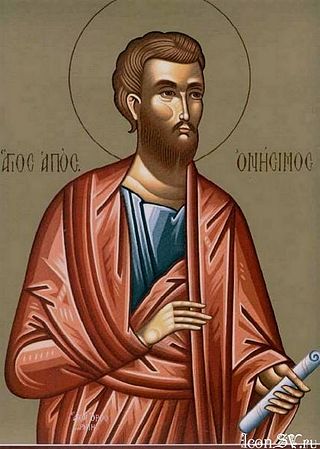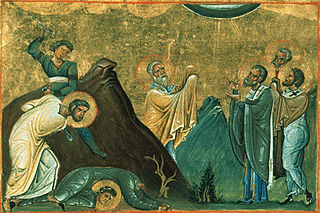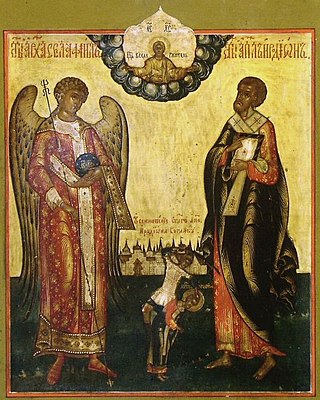Related Research Articles

Luke the Evangelist was one of the Four Evangelists—the four traditionally ascribed authors of the canonical gospels. The Early Church Fathers ascribed to him authorship of both the Gospel of Luke and the Acts of the Apostles. Prominent figures in early Christianity such as Jerome and Eusebius later reaffirmed his authorship, although a lack of conclusive evidence as to the identity of the author of the works has led to discussion in scholarly circles, both secular and religious.

Timothy or Timothy of Ephesus was an early Christian evangelist and the first Christian bishop of Ephesus, who tradition relates died around the year AD 97.
Sosthenes was the chief ruler of the synagogue at Corinth, who, according to the Acts of the Apostles, was seized and beaten by the mob in the presence of Gallio, the Roman governor, when Gallio refused to proceed against Paul at the instigation of the Jews. The motives of this assault against Sosthenes are not recorded. Some manuscripts assert the mob was composed of "Greeks"; others read "Jews".

Onesimus, also called Onesimus of Byzantium and The Holy Apostle Onesimus in the Eastern Orthodox Church, was a slave to Philemon, a man of Christian faith. He may also be the same Onesimus named by Ignatius of Antioch as bishop in Ephesus which would put Onesimus's death closer to 107. If so, Onesimus went from slave to brother to bishop.

Stachys the Apostle was the second bishop of Byzantium, from 38 AD to 54 AD according to tradition.

Pudens was an early Christian saint and martyr. He is mentioned as a layman of the Roman Church in 2 Timothy 4:21.

Quartus was an early Christian saint who is mentioned in the Bible.

Erastus of Corinth, also known as Erastus of Paneas, held the political office of steward, in Corinth, according to the Epistle to the Romans 16:23 of the New Testament. The office is defined as "the manager of household or of household affairs" or, in this context, "treasurer". The King James Version uses the translation "chamberlain", while the New International Version uses "director of public works". A person named Erastus mentioned in 2 Timothy 4:20 and Acts 19:22 is often taken to be the same person.

Cantius, Cantianus, and Cantianilla were Roman Christians who are venerated as saints and martyrs by the Eastern Orthodox Church and Roman Catholic Church. Their feast day is commemorated on 31 May.
Saint Achaicus of Corinth was a Corinthian Christian saint who according to the Bible, together with Saints Fortunatus and Stephanas, carried a letter from the Corinthians to Saint Paul, and from Saint Paul to the Corinthians.

Herodion of Patras has been thought by some to have been a relative (συγγενής) of Saint Paul, as in a greeting Paul calls a Herodion a sungenēs in Romans 16:11. But Paul uses the term συγγενής (sungenēs) for fellow Jews in Romans 9:3. So συγγενής (sungenēs) can mean relative even as broadly as fellow Jew. According to tradition, Herodion of Patras was numbered among the Seventy Disciples and became bishop of Patras, where he suffered greatly. After beating, stoning, and stabbing him; they left him for dead, but St. Herodion arose and continued to serve the Apostles.

Asyncritus of Hyrcania, also Asynkritos, was numbered among the Seventy Disciples. He was bishop of Hyrcania in Asia. Saint Paul mentions him in his letter to the Romans. The Eastern Orthodox Church remembers St. Asyncritus on 8 April. He is also commemorated on 4 January with the other Seventy Apostles.
Phlegon of Marathon is numbered among the Seventy Disciples. He was bishop of Marathon in Thrace. He is referenced in Romans 16:14, and his feast day is on April 8.

Philologus of Sinope is numbered among the Seventy Disciples, and is commemorated with them on January 4. He is also commemorated on November 5 together with Ss. Patrobas, Hermas, Linus, and Gaius.

Sosipater is a person mentioned in the New Testament, in Romans 16:21. He is probably the same person as Sopater mentioned in Acts 20:4.

According to the New Testament book of Romans, Tertius of Iconium acted as an amanuensis for Paul the Apostle, writing down his Epistle to the Romans.

Carpus of Beroea of the Seventy Disciples is commemorated by the Church on 26 May with St. Alphaeus, and on 4 January with the rest of the Seventy Disciples.
Stephanas was a member of the church at Corinth, whose family were among the limited number of believers whom Paul the Apostle had baptized there and whom Paul refers to as the “first-fruits of Achaia”.
References
- ↑ "Apostles Fortunatus, Akhaikos, and Stephanas of the 70". www.oca.org. Retrieved 2025-01-31.
- ↑ Hoole, Charles Holland (1888). The Classical Element in the New Testament, Considered as a Proof of Its Genuineness.
- ↑ "Fortunatus from the McClintock and Strong Biblical Cyclopedia". McClintock and Strong Biblical Cyclopedia Online. Retrieved 2025-01-31.
- ↑ "Lives of the Saints".
Bibliography
- This article is derived in whole or in part from Fortunatus (New Testament person) at OrthodoxWiki, which is dually licensed under CC-By-SA and GFDL. All relevant terms must be followed.
- Apostle Fortunatus of the Seventy - OCA website